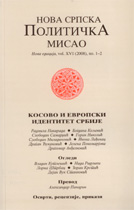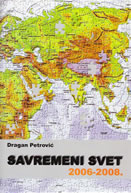| NSPM in English | |||
Gold Reclaims Its Currency Status as the Global System Unravels |
 |
 |
 |
| петак, 02. јул 2010. | |
|
(The Telegraph, 20.6.2010)
The ECB’s latest monthly bulletin gives us some startling details. It reveals that the bank’s "systemic risk indicator" surged suddenly to an all-time high on May 7 as measured by EURIBOR derivatives and stress in the EONIA swaps market, exceeding the strains at the height of thе Lehman Brothers crisis in September 2008. "The probability of a simultaneous default of two or more euro-area large and complex banking groups rose sharply," it said. This is a unsettling admission. Which two "large and complex banking groups" were on the brink of collapse? We may find out in late July when the stress test results are published, a move described by Deutsche Bank chief Josef Ackermann as "very, very dangerous". And are we any safer now that the EU has failed to restore full confidence with its €750bn (£505bn) "shock and awe" shield, that is to say after throwing everything it can credibly muster under the political constraints of monetary union? This is the deep angst that lies behind last week's surge in gold to an all-time high of $1,258 an ounce. The World Gold Council said on Friday that the central banks of Russia, the Philippines, Kazakhstan and Venezuela have been buying gold, and Saudi Arabia’s monetary authority has "restated" its reserves upwards from 143m to 323m tonnes. If there is any theme to the bullion rush, it is fear that the global currency system is unravelling. Or, put another way, gold itself is reclaiming its historic role as the ultimate safe haven and benchmark currency. It is certainly not inflation as such that is worrying big investors, though inflation may be the default response before this is all over. Core CPI in the US has fallen to the lowest level since the mid-1960s. Unlike the blow-off gold spike of the Nixon-Carter era, this rally has echoes of the 1930s. It is a harbinger of deflation stress. Capital Economics calculates that the M3 money supply in the US has been contracting over the past three months at an annual rate of 7.6pc. The yield on two-year Treasury notes is 0.71pc. This is an economy in the grip of debt destruction. Albert Edwards from Societe Generale says the Atlantic region is one accident away from outright deflation - that 9th Circle of Hell, "abandon all hope, ye who enter" . Such an accident may be coming. The ECRI leading indicator for the US economy has fallen at the most precipitous rate for half a century, dropping to a 45-week low. The latest reading is -5.70, the level it reached in late-2007 just as Wall Street began to roll over and then crash. Neither the Fed nor the US Treasury were then aware that the US economy was already in recession. The official growth models were wildly wrong. David Rosenberg from Gluskin Sheff said analysts are once again "asleep at the wheel" as the Baltic Dry Index measuring freight rate for bulk goods breaks down after a classic triple top. The recovery in US railroad car loadings appears to have stalled, with volume still down 10.5pc from June 2008. The National Association of Home Builders’ index of "future sales" fell in May to the lowest since the depths of slump in early 2009. RealtyTrac said home repossessions have reached a fresh record. A further 323,000 families were hit with foreclosure notices last month. "We’re nowhere near out of the woods," said the firm. It is an academic question whether the US slips into a double-dip recession, or merely grinds along for the next 12 months in a "growth slump". For Europe, nothing short of a sustained global boom can lift the eurozone out of the deflationary quicksand already swallowing up the South. Spain had to pay a near-record spread of 220 basis points over German Bunds last week to clear away an auction of 10-year bonds, roughly what Greece was paying in March. Leaked transcripts of a closed-door briefing to the Cortes by a central bank official revealed that Spanish companies have been shut out of the capital markets since Easter. Given that the Spanish state, juntas, banks and firms have together built up foreign debts of €1.5 trillion, or 147pc of GDP, and must roll over €600bn of these debts this year, this is a crisis unlikely to cure itself. By their actions, investors show that they do believe the EU can be relied upon to back its rescue rhetoric with hard money, and for good reason. Germany’s coalition risks breaking up at any moment, fatally damaged by popular fury over the Greek bail-out. Far-Right populist Geert Wilders is suddenly the second force in the Dutch parliament. Flemish separatists have just won the Belgian elections in Flanders. The likelihood that an ever-reduced group of German-bloc creditors facing disorder and budget cuts at home will keep footing the bill for an ever-widening group of Latin-bloc debtors in distress is diminishing by the day. Fitch Ratings said it will take "hundreds of billions" of bond purchases by the ECB to stop the crisis escalating. Since Bundesbank chief Axel Weber has already deemed the first tranche of purchases to be a "threat to stability", it is a safe bet that Germany will fight tooth and nail to prevent such a move to full-blown quantitative easing. The blood-letting along the fault-line between Teutonic and Latin Europe will go on, as the crisis festers. Yet the markets are already moving on, in any case. They doubt whether the EU’s strategy of imposing of wage cuts on half of Europe without offsetting monetary and exchange stimulus can work. Such a policy crushes tax revenues and risks tipping states into a debt-deflation spiral, as if everbody had forgotten the lesson of the 1930s. Greece’s public debt will rise from 120pc to 150pc of GDP under the IMF-EU plan. There is a futile cruelty to this. As Russia’s finance minister Alexei Kudrin acknowledges, a Greek "mini-default" has become inevitable. EU president Herman Van Rompuy confessed that EMU lured countries into a fatal trap. "It was like some kind of sleeping pill, some kind of drug. We weren’t aware of the underlying problems," he said. What he has yet to admit is that the North-South imbalances built up since the euro was launched - indeed, because the euro was launched - cannot be corrected by further loans from the North or by pushing the South in depression. The political fuse will run out before this reactionary and self-defeating policy is tested to destruction. Ambrose Evans-Pritchard is the international business editor of the Daily Telegraph. He was the Telegraph's Europe correspondent in Brussels from 1999 to 2004. |
Остали чланци у рубрици
- Playing With Fire in Ukraine
- Kosovo as a res extra commercium and the alchemy of colonization
- The Balkans XX years after NATO aggression: the case of the Republic of Srpska – past, present and future
- Из архиве - Remarks Before the Foreign Affairs Committee of the European Parliament
- Dysfunction in the Balkans - Can the Post-Yugoslav Settlement Survive?
- Serbia’s latest would-be savior is a modernizer, a strongman - or both
- Why the Ukraine Crisis Is the West’s Fault
- The Ghosts of World War I Circle over Ukraine
- Nato's action plan in Ukraine is right out of Dr Strangelove
- Why Yanukovych Said No to Europe

.jpg)








 Jean-ClaudeTrichet, the president of the European Central Bank (EC), talked days later of "the most difficult situation since the Second World War, and perhaps the First".
Jean-ClaudeTrichet, the president of the European Central Bank (EC), talked days later of "the most difficult situation since the Second World War, and perhaps the First".











